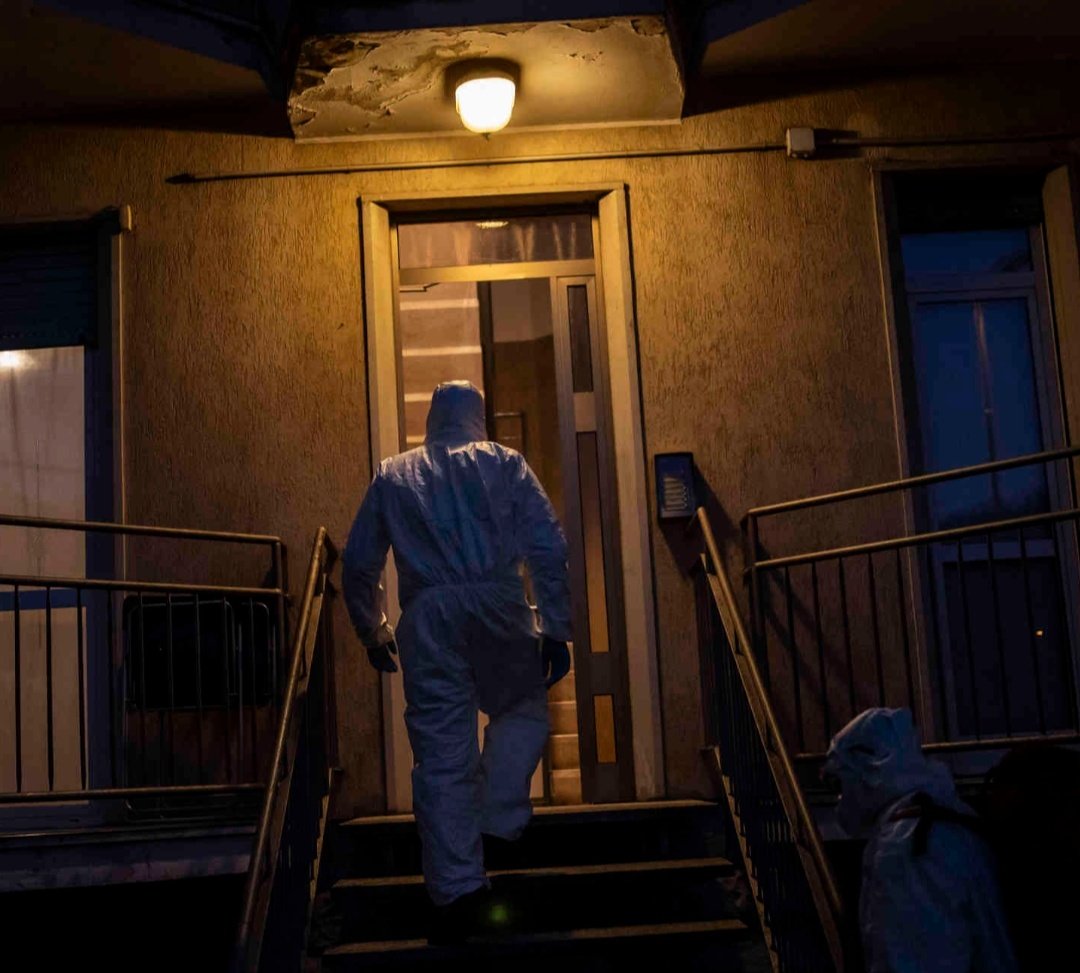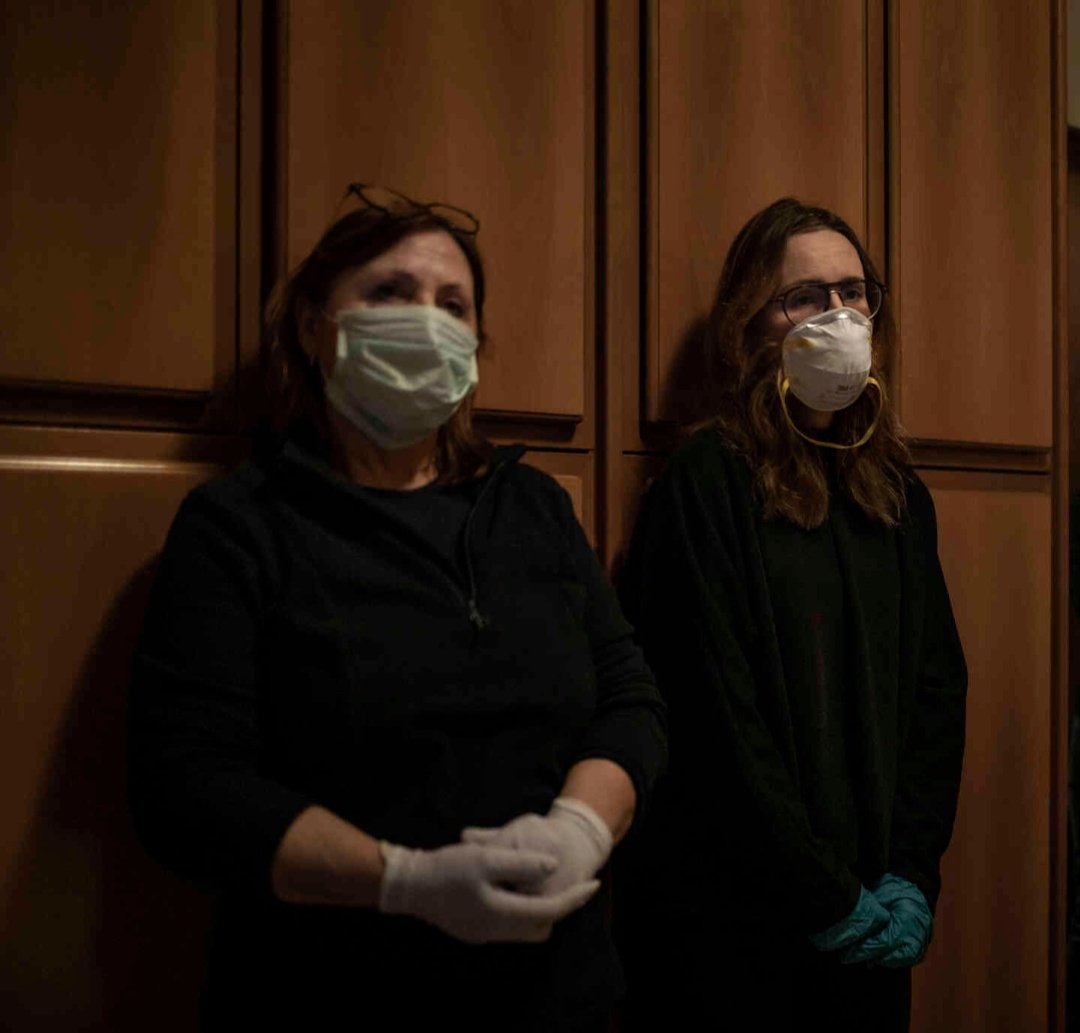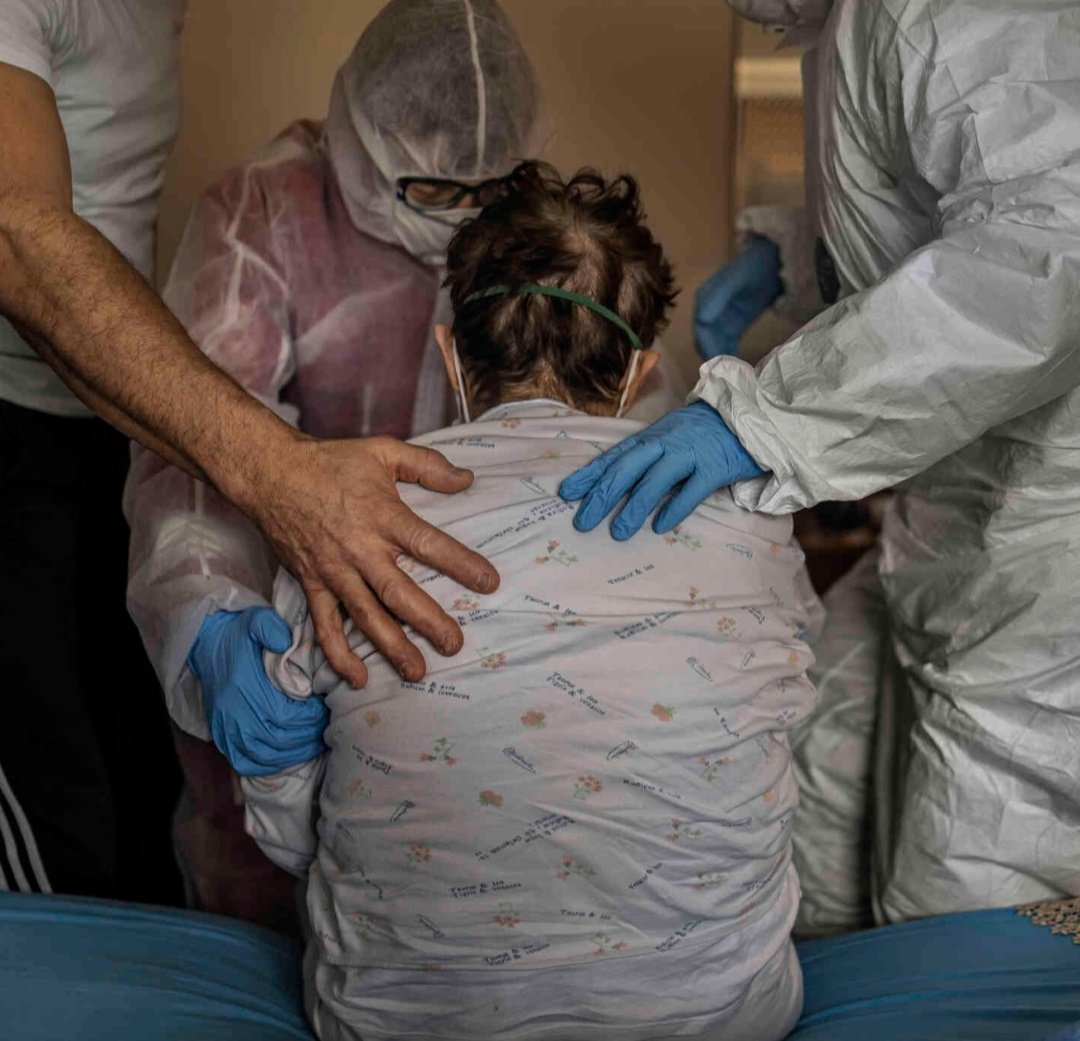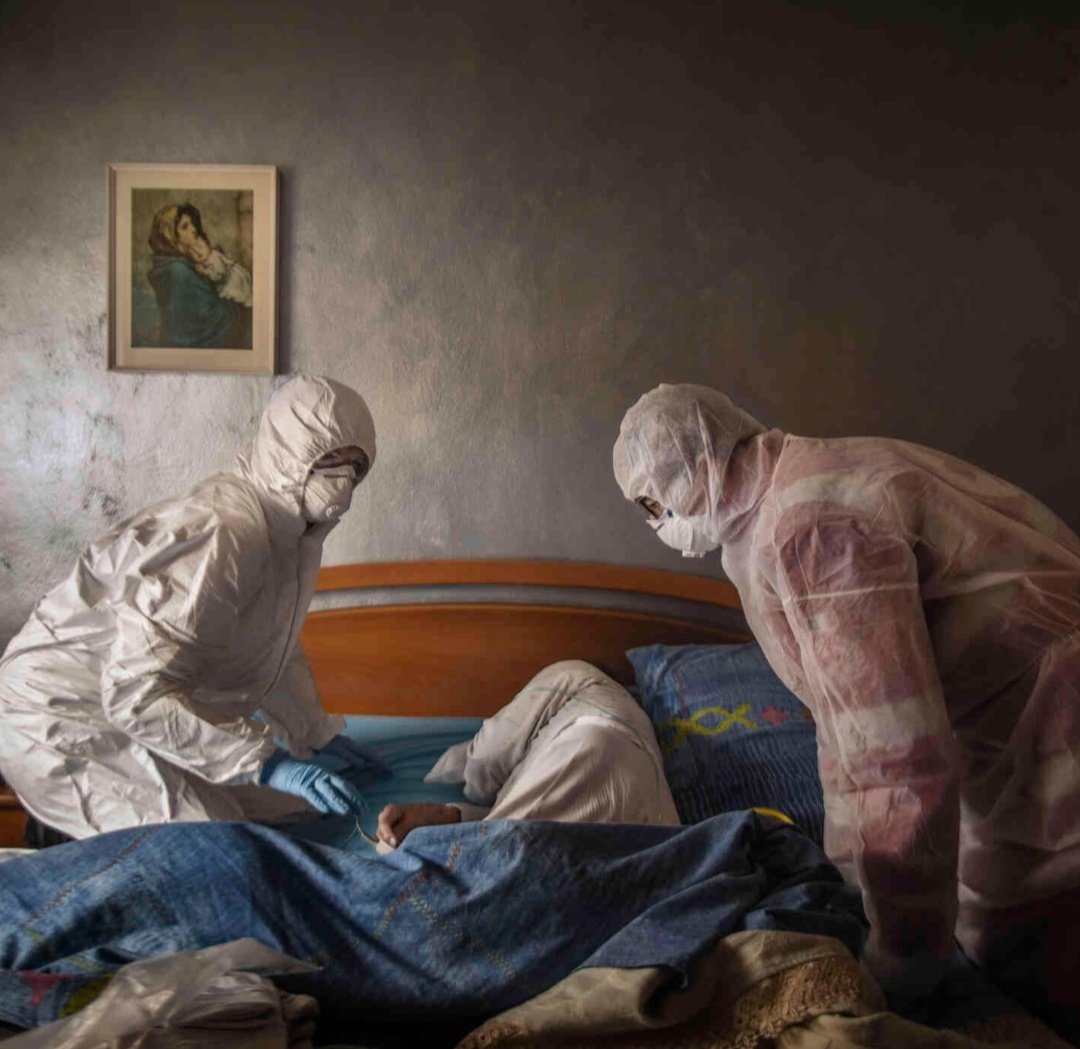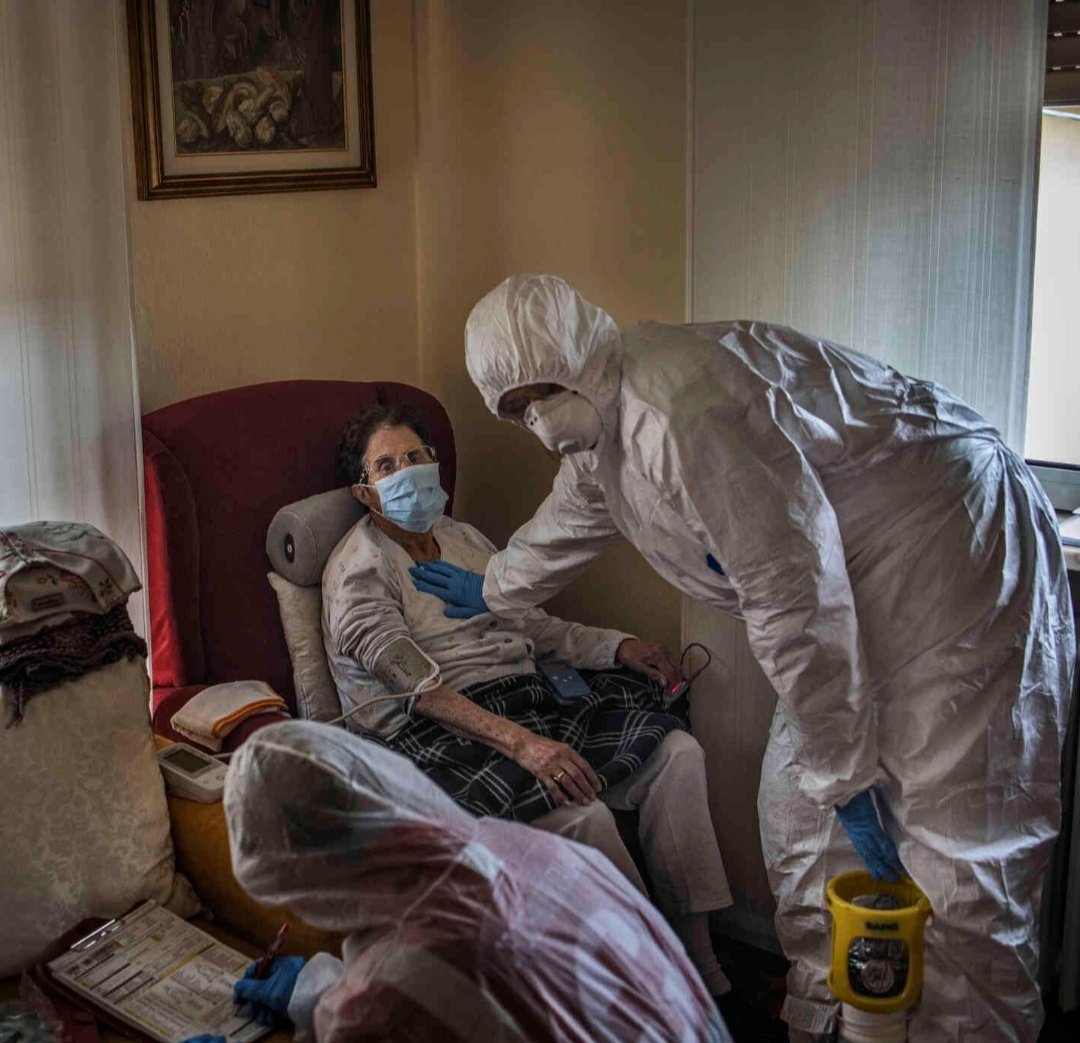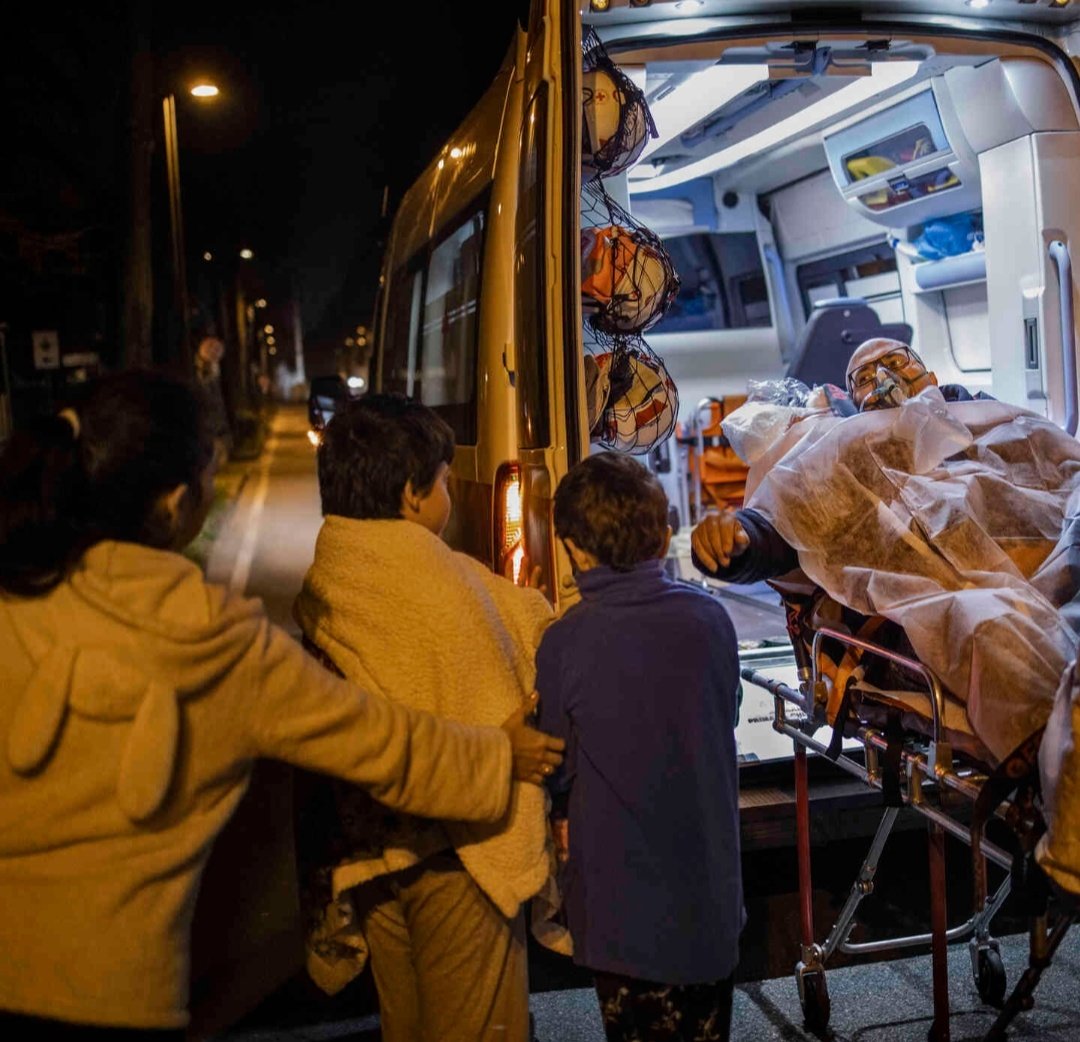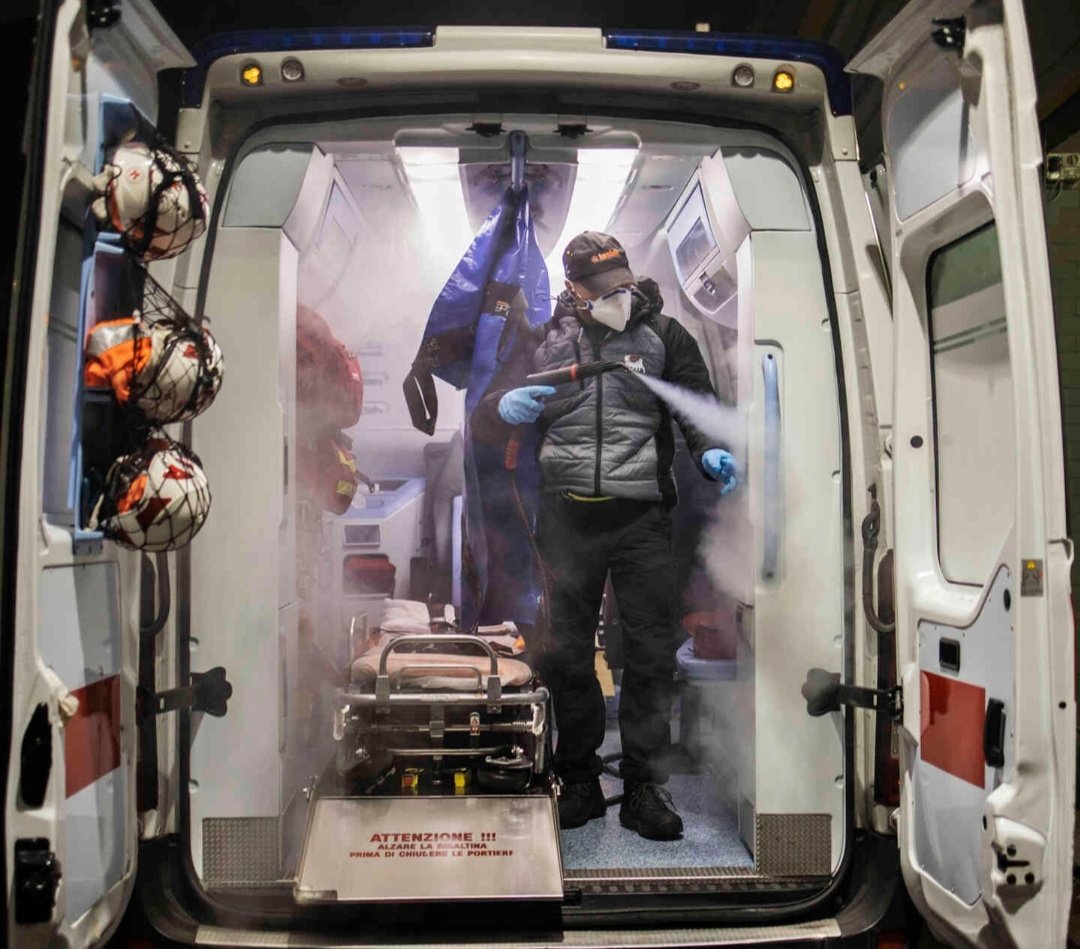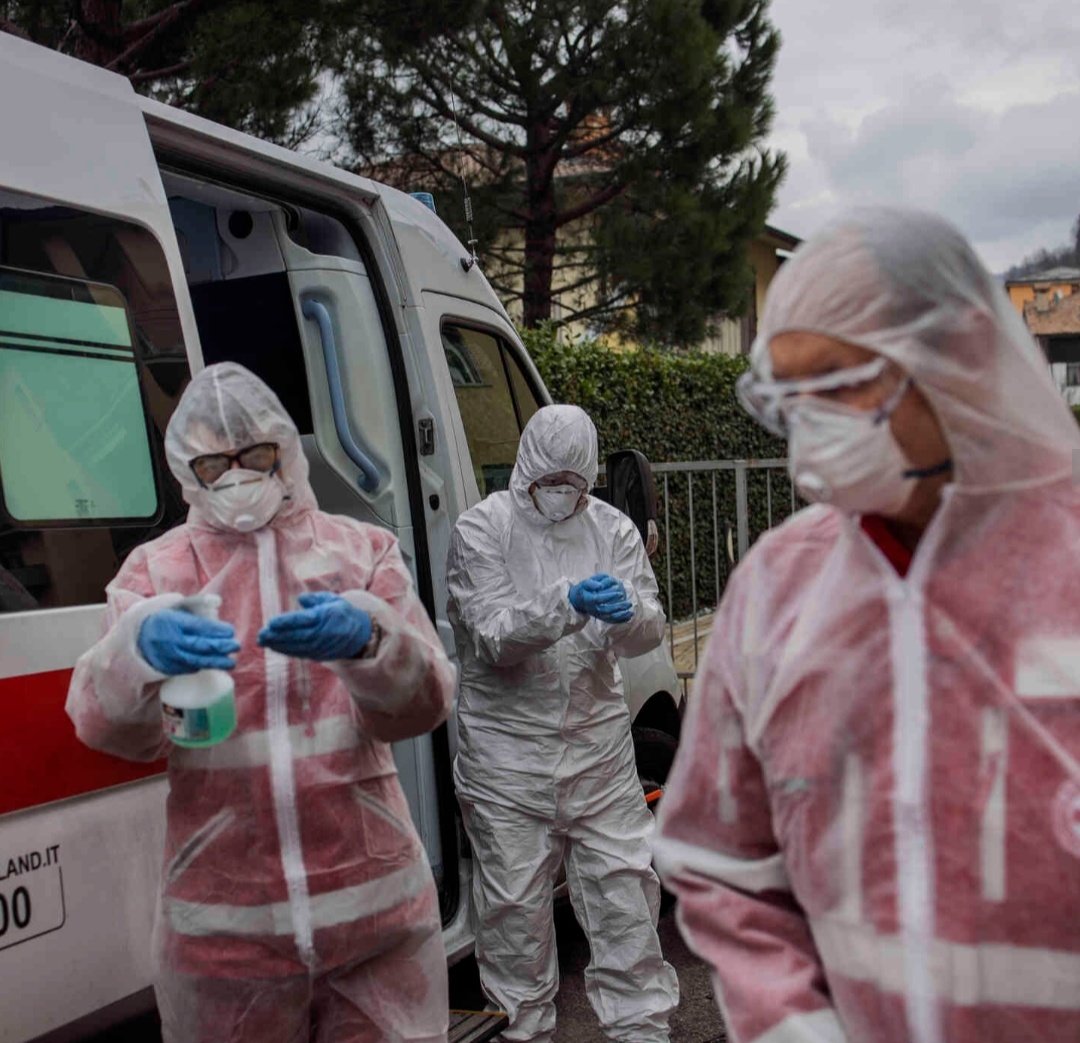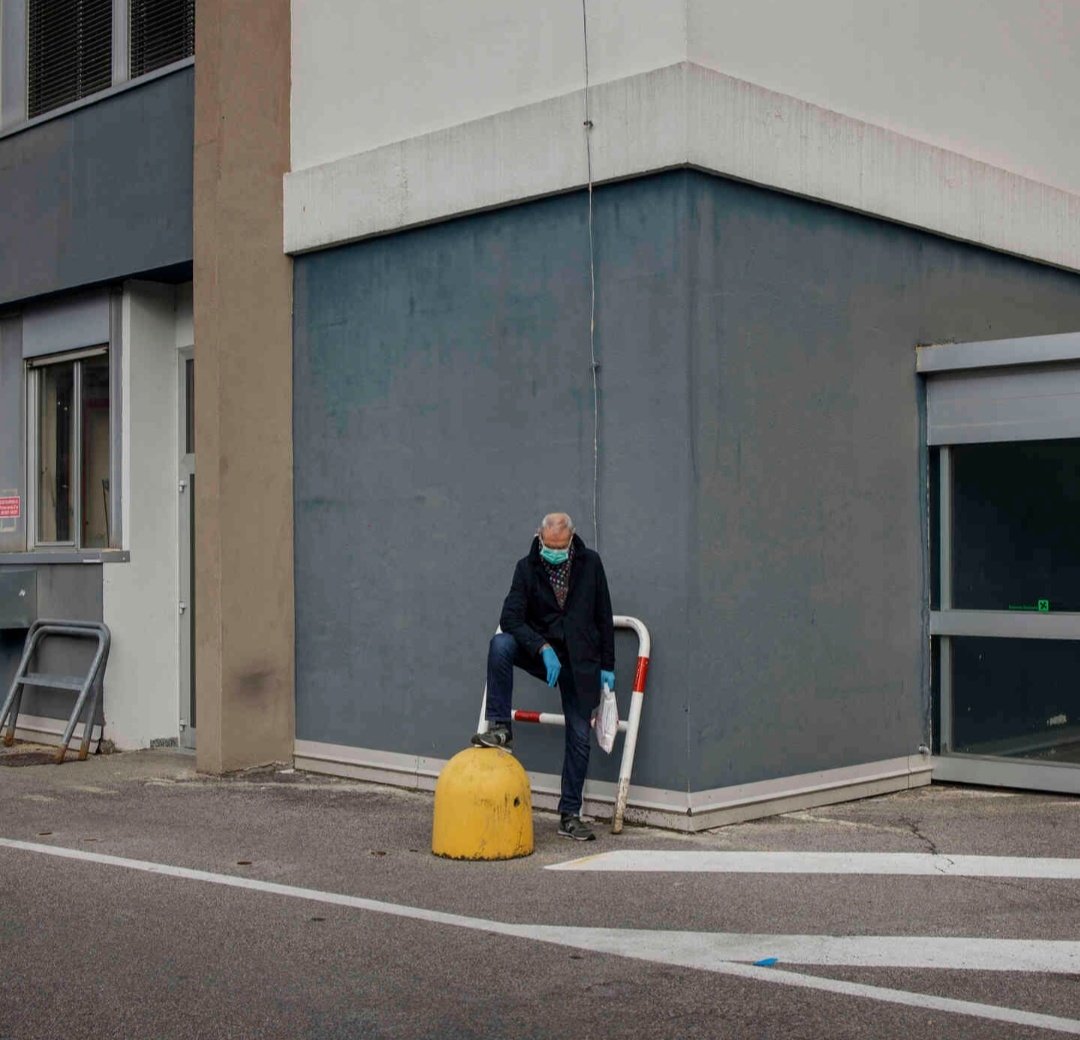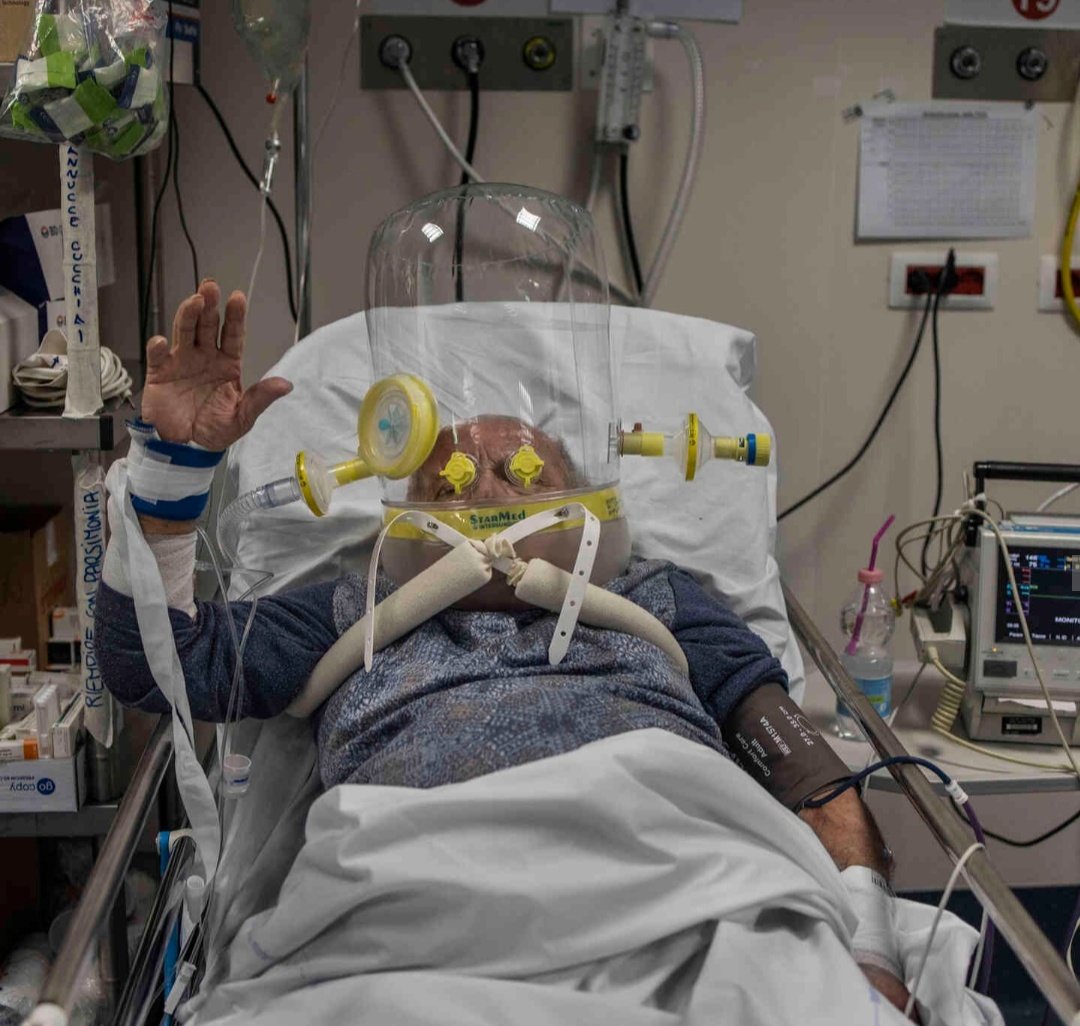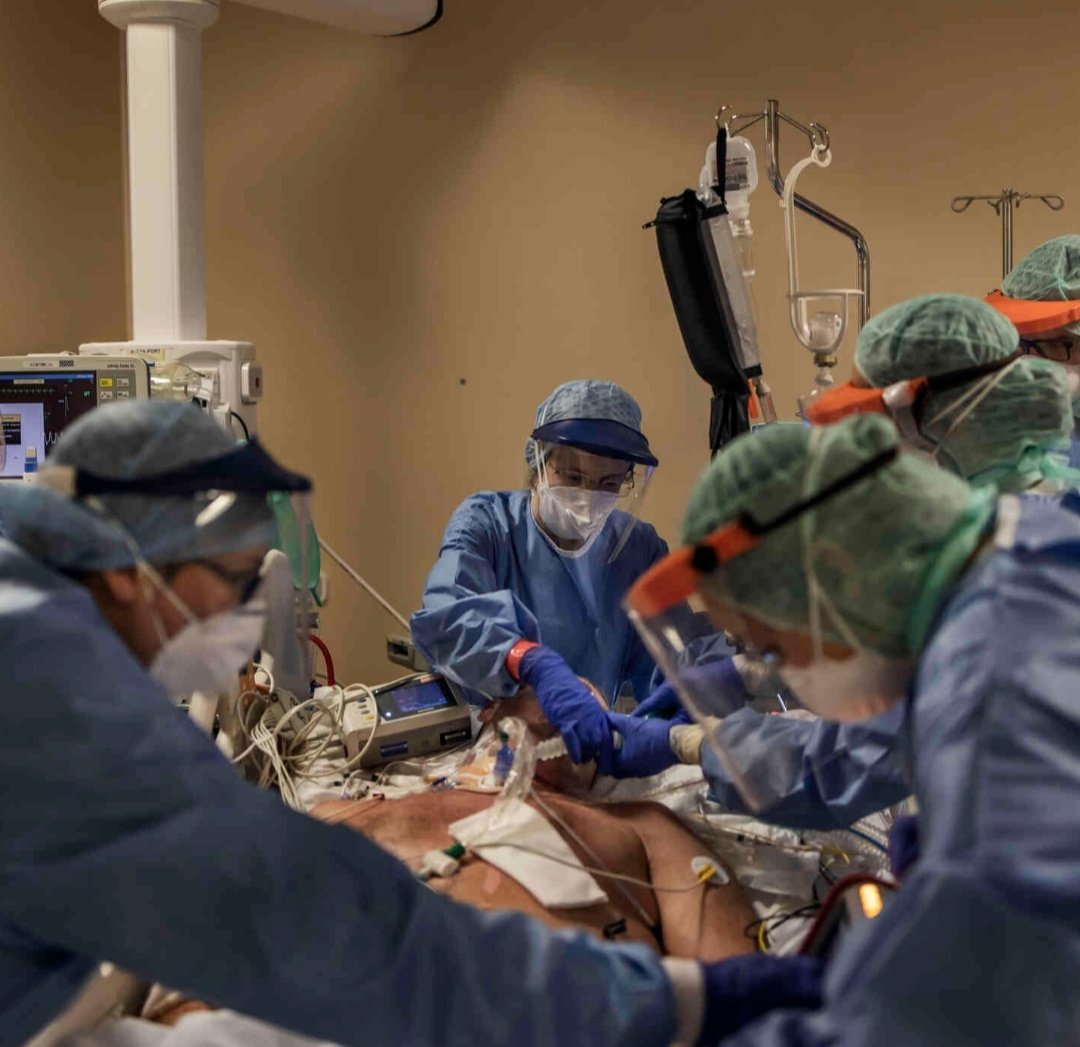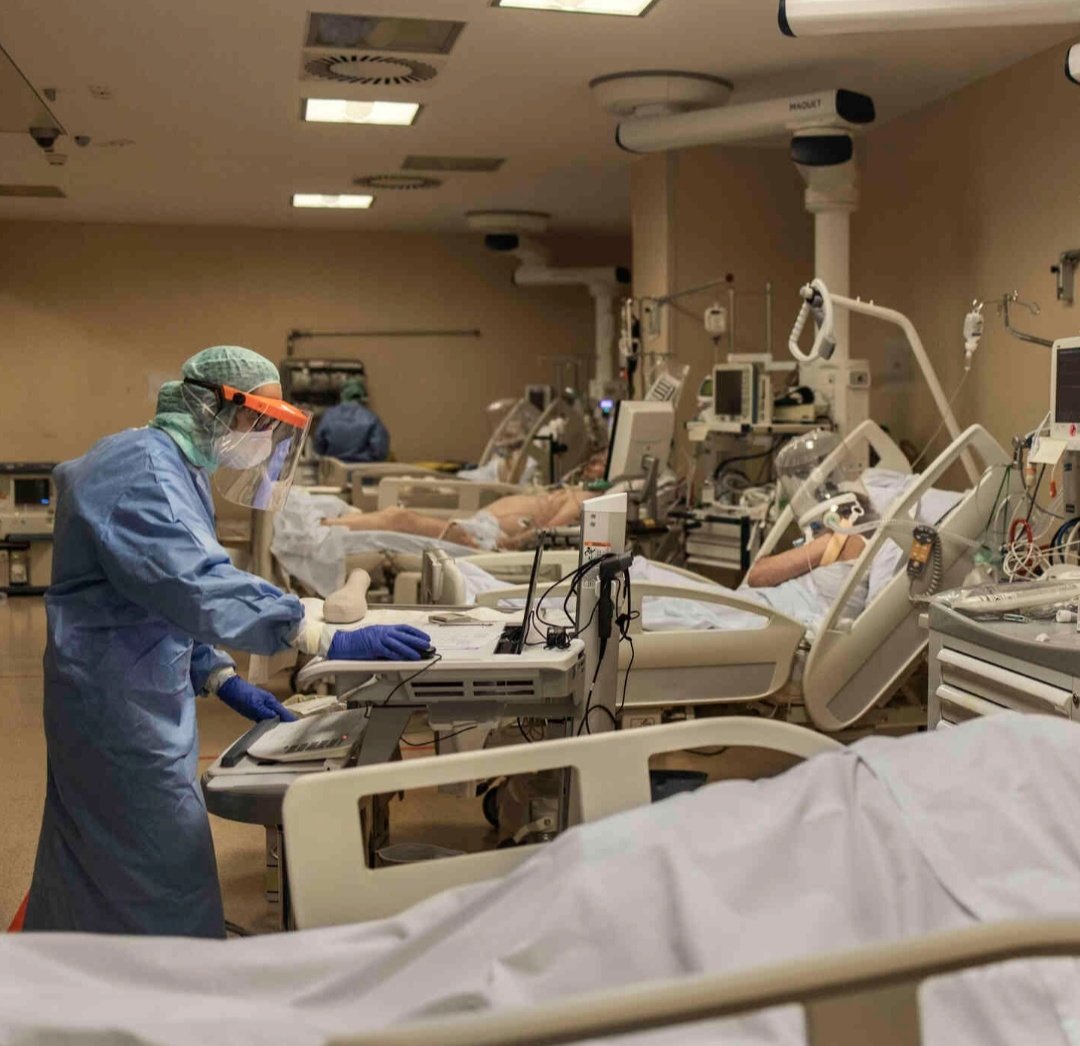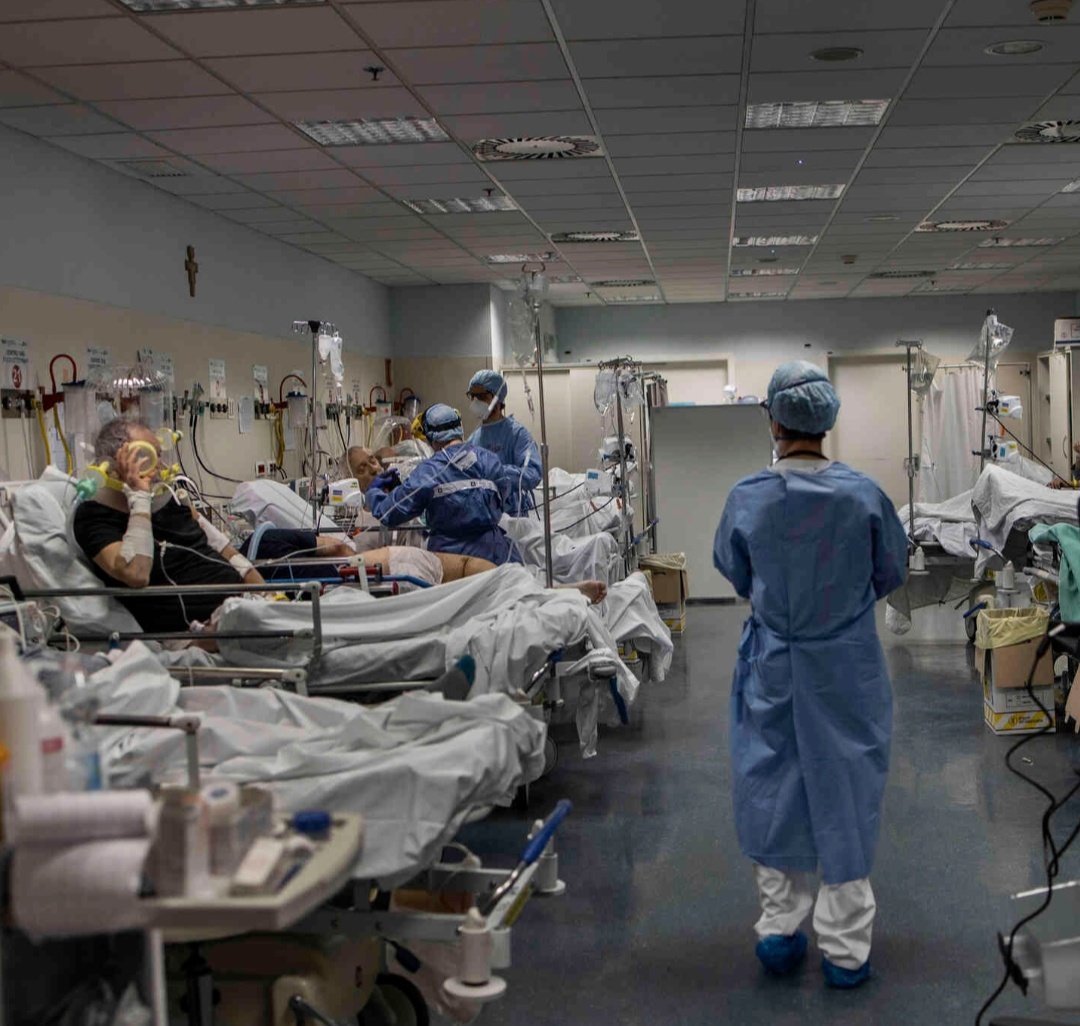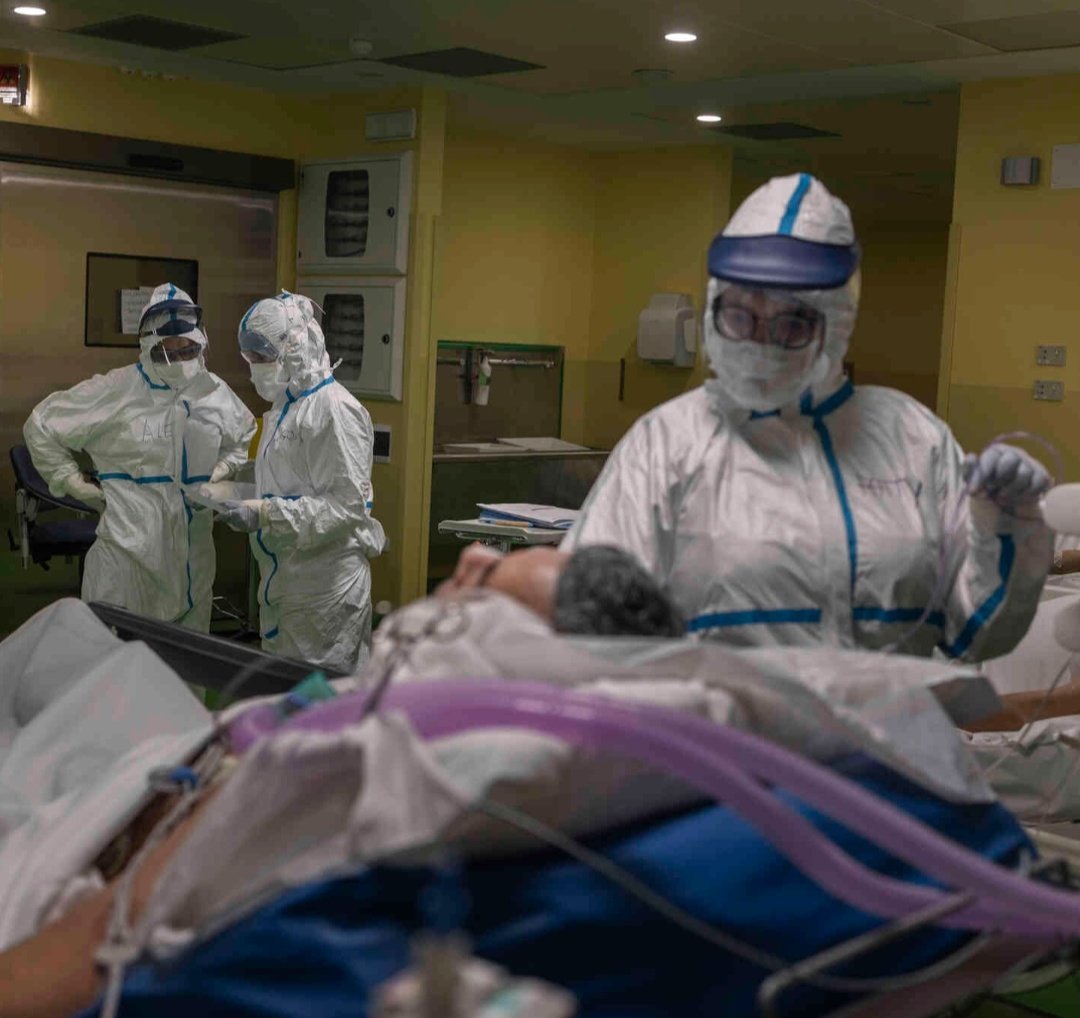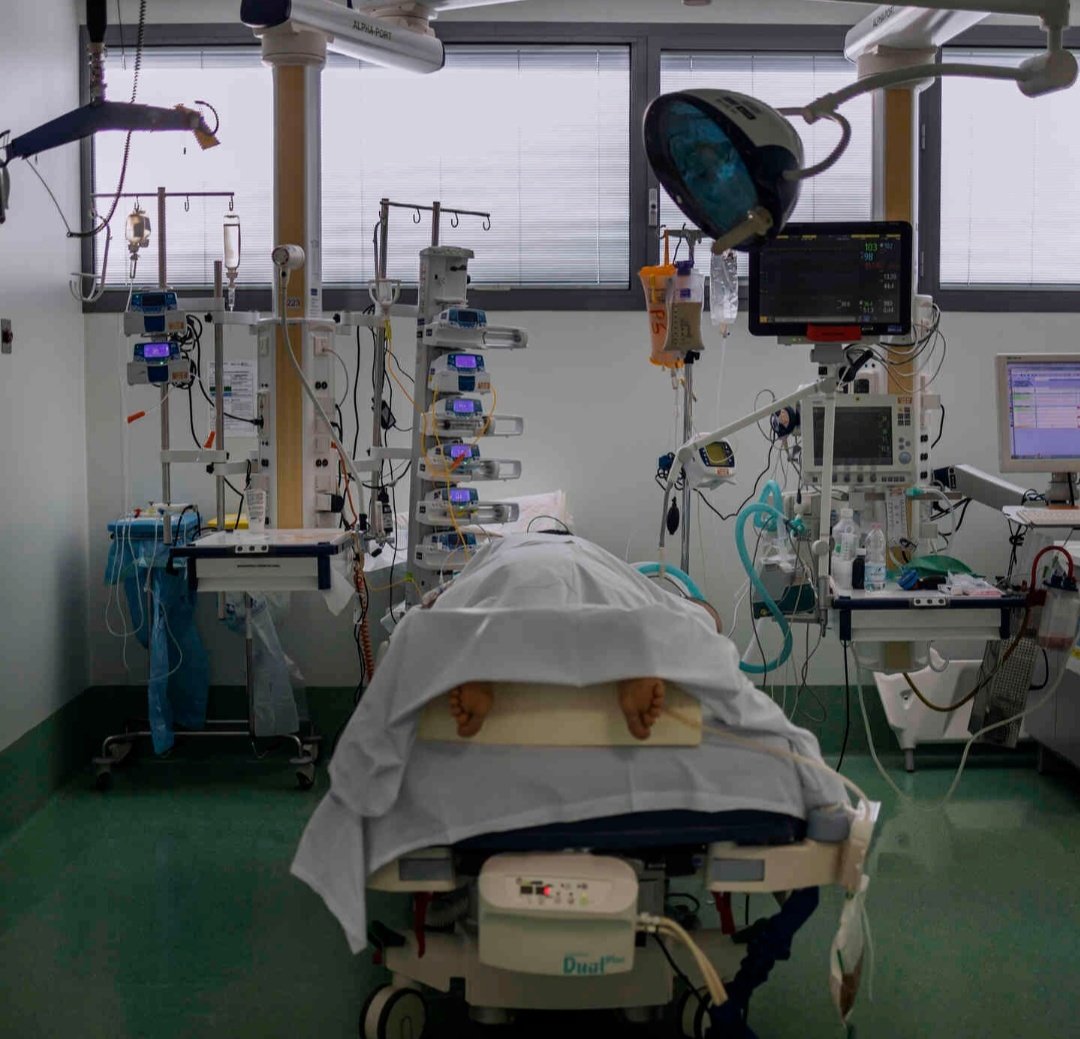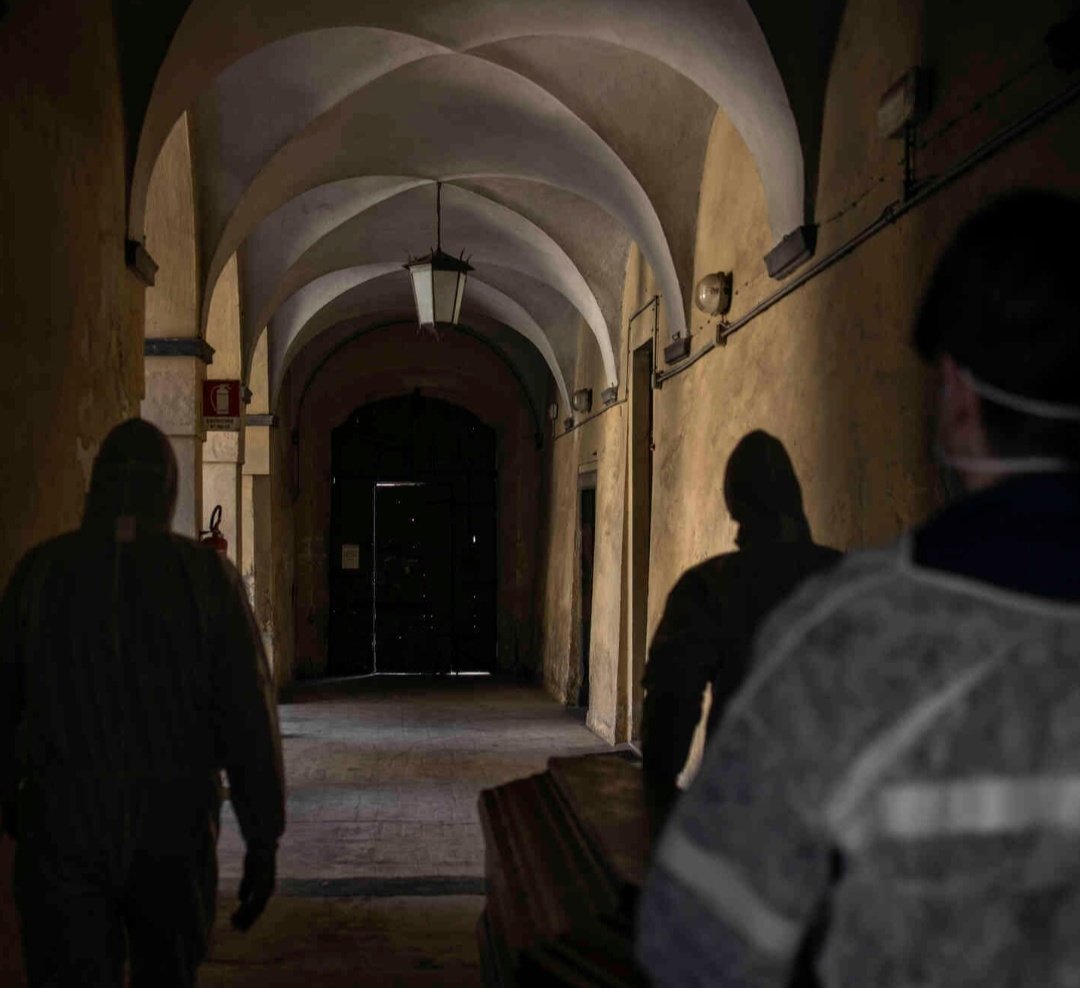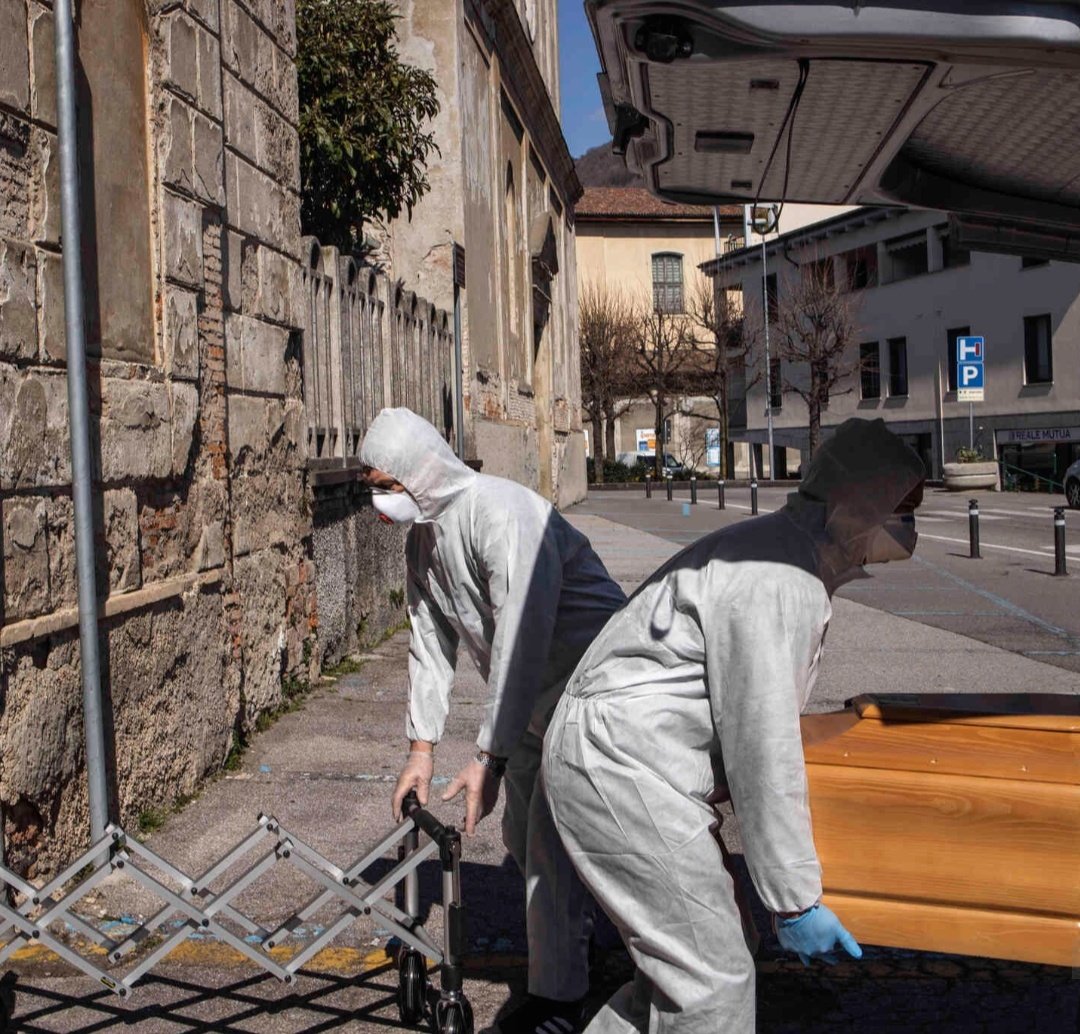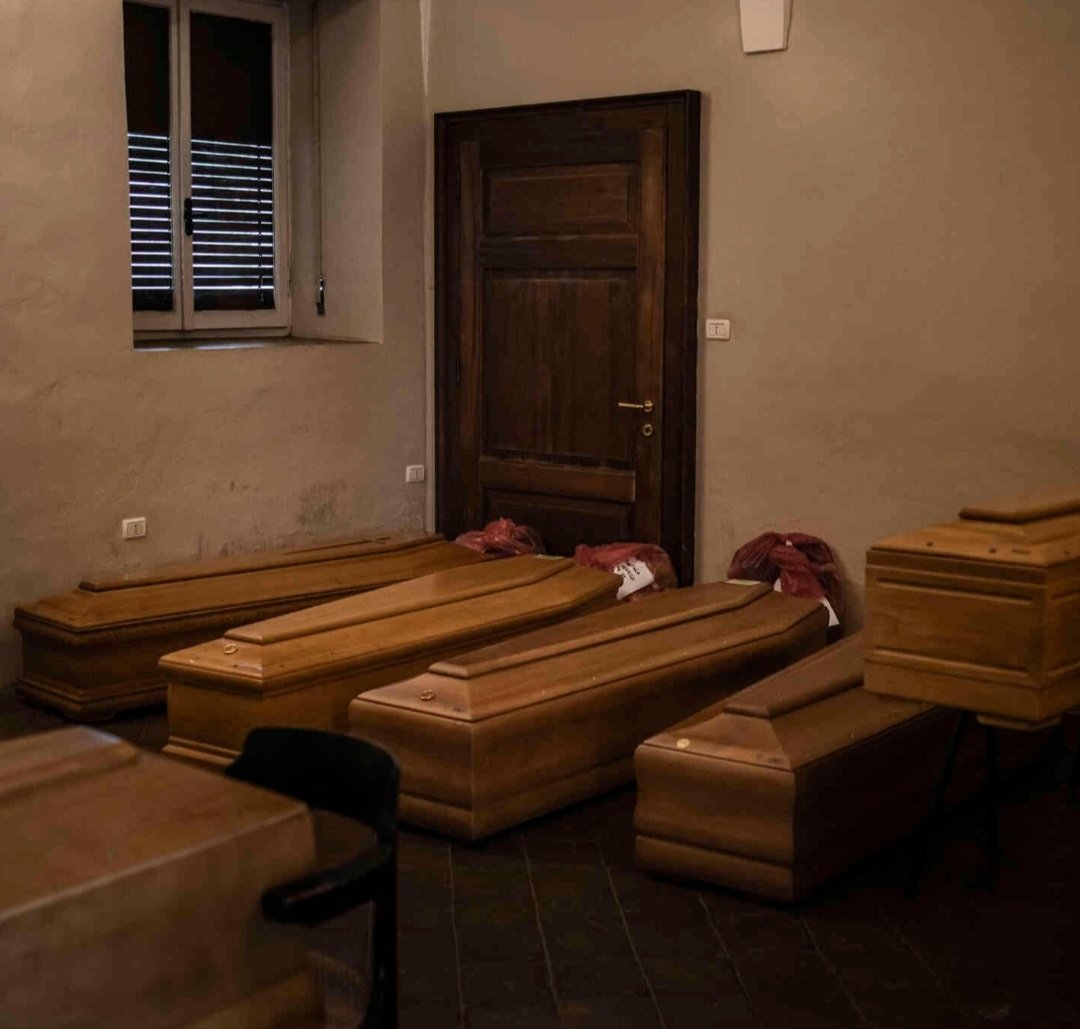Ini adalah kisah yang berlaku di Bergamo, Italy. Tempat yang menjadi kawasan paling bahaya serta mencatat kematian beribu orang di Italy disebabkan COVID-19. Ini adalah kisah kematian yang menakutkan dan sangat memilukan.
Local newspaper sampai terpaksa berhenti print death notices kerana terlalu banyak kematian dan mereka tak terdaya nak laporkan setiap satu kematian.
Once known as a quiet and wealthy province, Bergamo is now a place where Red Cross workers go door to door, carrying away the patients.
Bergamo is also the place where patients line along the hospital corridors, waiting to be treated. The very place where these poor souls spread their disease to their frontliners unintentionally.
This is Bergamo, where the coffins are so numerous, the army has been called to take them from warehouses for cremation.
- We Take the Dead From Morning Till Night -
Photographs by Fabio Bucciarelli
Written by Jason Horowitz
Photographs by Fabio Bucciarelli
Written by Jason Horowitz
Sepanjang tempoh Italy dilanda COVID-19 yang sangat teruk, kilang-kilang ditutup, kedai-kedai serta sekolah-sekolah tidak dibuka seperti hari-hari biasa, tiada lagi kedengaran hiruk-pikuk di kedai-kedai kopi. Semuanya sepi dan sunyi seakan-akan bandar yang tidak berpenghuni.
But what won& #39;t stop are the sirens.
While the world’s attention now shifts to its own centers of contagion, the sirens keep sounding. Like the air raid sirens of the World War 2, they are the ambulance sirens that many survivors of this war will remember.
They blare louder as they get closer, coming to collect the parents and grandparents, the keepers of Italy’s memory.
Bunyi siren yang datang dari ambulance tidak pernah berhenti berbunyi di Bergamo, walaupun pada tengah malam. Bunyi ini sentiasa menghantui penduduk Bergamo, kerana mereka tahu ada satu lagi warga Bergamo tumbang disebabkan COVID-19.
Suasana meriah di Bergamo sebelum apocalypse ini berlaku bertukar menjadi hari-hari yang menakutkan kerana mereka sentiasa mendengar bunyi siren ambulance datang dan pergi, menunggu masa bilakah mereka pula yang akan dijemput oleh ambulance yang sama.
Pada 07/03, Claudio Travelli seorang pemandu food delivery truck jatuh sakit. Demam dan flu-like symptoms. Sejak itu, isterinya juga turut jatuh sakit, dan berkemungkinan berjangkit daripada suaminya.
Mr Travelli berjumpa dengan doktor dan doktor hanya menyuruh dia makan ubat dan berehat. Tidak sama sekali doktor dan Mr Travelli menyangka demam dan flu-like itu ada kaitan dengan COVID-19.
Pada 13/03, Mr Travelli masih lagi tidak sembuh, bahkan semakin teruk keadaannya. Dia mengalami sakit dada yang digambarkan indescribable and unbearable, serta vomit-like feelings but he didn& #39;t vomit.
Suhu badannya naik dan keadaan Mr Travelli semakin serious, ahli keluarganya memanggil ambulance untuk membawa Mr Travelli ke hospital.
Medical staff yang datang segera memeriksa Mr Travelli dan mendapati dia mempunyai low levels of oxygen in his blood.
Medicall staff turut menyatakan pada ahli keluarga Mr Travelli, following the advice of Bergamo’s hospitals, it was recommended for Mr Travelli to stay home.
"We have seen worse, and the hospitals are like the trenches of a war."
"We have seen worse, and the hospitals are like the trenches of a war."
Red Cross workers have the dangerous task of entering the homes of people suspected of being infected by coronavirus.
Mr Travelli& #39;s wife and daughter, waited to see if he would be taken away to a hospital.
Memandangkan Mr Travelli tidak dibawa ke hospital atas saranan hospital di Bergamo, dia terpaksa duduk di rumah, dipantau oleh ahli keluarganya sendiri.
Ini menjadikan keadaan Mr Travelli semakin kronik. Batuk yang teruk, demam. Kulitnya juga bertukar kuning.
Ini menjadikan keadaan Mr Travelli semakin kronik. Batuk yang teruk, demam. Kulitnya juga bertukar kuning.
One night, Mr Travelli woke up and told his daughter that he could not take it anymore, he felt very, very sick. Suhu badannya semakin meninggi, mencecah hampir 40°C. Dengan segera, anaknya menghubungi ambulance.
This time, as the ambulance arrived, his daughters, both wearing gloves and masks, packed a bag with two pairs of pajamas, a bottle of water, a cellphone and a charger. His oxygen levels had dipped.
Ahli keluarga Mr Travelli termasuk cucu-cucunya hanya mampu melambai Mr Travelli yang telah diusung masuk ke dalam ambulance. Ambulance segera meninggalkan rumah itu dan menuju ke hospital.
"Only the police and the sirens," his daughter said.
"Only the police and the sirens," his daughter said.
Mr Travelli bukanlah pesakit pertama yang dibawa ke hospital oleh ambulance tersebut. Sejak pagi, ambulance itu sibuk bergerak ke sana sini, dan dipastikan dalam keadaan bersih serta stocked with oxygen. Saat ini, oxygen tanks semakin berkurang, sama seperti masks and gloves.
Tetapi Red Cross volunteers yang terlibat memastikan mereka sanitise serta disinfect ambulance, diri sendiri serta telefon bimbit mereka.
"We cannot be the spreader," said Nadia Vallati, salah seorang Red Cross volunteer.
"We cannot be the spreader," said Nadia Vallati, salah seorang Red Cross volunteer.
Nadia dan rakan-rakan volunteer yang lain menanti di HQ untuk panggilan kes-kes seterusnya, dan mereka tidak perlu tunggu lama untuk bergerak dan membawa pesakit-pesakit baru COVID-19. Setiap saat, setiap minit, setiap masa ada sahaja panggilan.
Ketika ambulance Nadia ini tiba di rumah Mr Travelli pada 15/03, mereka bawa bersama tanks of oxygen.
"Always with oxygen," kata Nadia.
"Always with oxygen," kata Nadia.
One of the biggest dangers for coronavirus patients is hypoxemia, or low blood oxygen. Normal readings are between 95 and 100, and doctors worry when the number dips below 90.
Namun begitu, Nadia turut menyatakan bahawa ada patients yang mencatat bacaan sangat rendah, serendah 50.
Their lips are blue. Their fingertips turn violet. They take rapid, shallow breaths and use their stomach muscles to pull in air. Their lungs are too weak.
Their lips are blue. Their fingertips turn violet. They take rapid, shallow breaths and use their stomach muscles to pull in air. Their lungs are too weak.
Some patients were too weak to move from the bed, some were barely conscious when Red Cross workers arrived.
Pesakit COVID-19 diberi small oxygen tanks sepanjang mereka duduk di rumah. Oxygen tanks ini dibawa serata tempat. Makan, minum, menonton TV dengan oxygen tanks mereka.
Pada 15/03 juga, Nadia memeriksa keadaan Teserina Coria berusia 88 tahun. Nadia juga memeriksa Antonio Amato, 40 yang duduk di rumah, tapi tidak sesekali mahu menyentuh anak-anaknya kerana takut berjangkit.
Nadia turut memeriksa pesakit lelaki berusia 90 tahun. Terdapat kematian dalam keluarga ini disebabkan COVID-19 iaitu anak kepada pesakit ini. Manakala isterinya di hospital, dalam keadaan critical.
Nadia said the family members weren’t crying, because they didn’t have any tears left. That was how bad COVID-19 had affected this family.
The oxygen tank held by Antonio Amato, 40. His children said goodbye, uncertain whether they would see him again.
In a other area, Nadia said, they picked up a woman of about 80. Her husband of many decades asked to kiss her goodbye. But Nadia told him he could not, because the risk of contagion was too high.
As the man watched the crew take his wife away, Nadia saw him go into another room and close the door behind him. It was so heartbreaking. The husband could not kiss the wife, and nobody knew if his wife could make it and survive.
Hospital di Bergamo juga tidak selamat. Ada kes-kes yang menyebabkan frontliners mereka serta orang awam lain dijangkiti virus COVID-19 ketika berada di sana.
Bergamo officials first detected the coronavirus at the Pesenti Fenaroli di Alzano Lombardo hospital.
Bergamo officials first detected the coronavirus at the Pesenti Fenaroli di Alzano Lombardo hospital.
Pada awalnya, pesakit-pesakit yang positive COVID-19 tidak diketahui status mereka (pemeriksaan COVID-19 tidak dijalankan), kerana pesakit-pesakit hanya menunjukkan symptoms pneumonia. So they were treated as such.
Little did they know, it was actually that deadly virus. Saat ini, doktor-doktor, para jururawat serta pesakit-pesakit lain di hospital tersebut telah dijangkiti virus COVID-19 tanpa mereka sedari.
People carried it out of the hospital and into the city, out of the city and into the province. Young people passed it to their parents and grandparents. It spread around bingo halls and over coffee cups, unnoticed.
Waktu itu, terdapat juga perlawanan Bola sepak CL antara Atalanta dan Valencia. Difahamkan, seramai 40,000 football fans dari Bergamo pergi ke Milan untuk menonton perlawanan ini.
The mayor, Mr. Gori, has talked about how infections have ravaged his town and nearly broken one of Europe’s wealthiest and most sophisticated health care systems. Doctors estimate that 70,000 people in the province have the virus.
Bergamo has had to send 400 bodies to other provinces and regions and countries because there is no room for them there.
"If we have to identify a spark, it was the hospital."
"If we have to identify a spark, it was the hospital."
Paramedics sentiasa berjaga-jaga dan mereka hanya benarkan 3 ahli untuk naik ke ambulance dan pergi ke rumah-rumah pesakit. Only one of the three which is the team leader, accompanies the patient inside. If the patient is heavy, another helps.
Red Cross workers disinfect the ambulance and themselves. Hospitals were no longer safe as people would probably get infected from there.
Sekumpulan doktor di Bergamo turut menulis di dalam medical journal bahawa hospital di sana dipercayai telah menjadi pusat utama penyebaran virus COVID-19 kerana hospital dibanjiri pesakit positive COVID-19 dan mungkin mereka telah menyebarkan virus pada uninfected patients.
Ambulance serta mereka yang di dalam ambulance mungkin juga infected tanpa mereka sedari, dan menjadi spreader pada orang lain. Oleh sebab itu, hospital menggesa home care atau klinik tidak menghantar sesiapa ke hospital melainkan sangat-sangat urgent.
Dr. Ivano Riva, an anesthesiologist there, said the hospital was still admitting up to 60 new coronavirus patients a day.
They are tested for the virus he said, but at this point the clinical evidence — the coughs, the low oxygen levels, the fevers — is a better indicator, especially since 30 percent of the tests produced false negatives.
The hospital had 500 coronavirus patients, who occupied all 90 I.C.U. beds. About a month ago, the hospital had seven such beds.
Menurut Nadia, mereka tetap terpaksa mengambil para pesakit yang tenat ataupun kritikal dan menghantar mereka ke hospital. Angka pesakit positive COVID-19 semakin hari semakin meningkat.
Bergamo, Papa Giovanni XXIII Hospital
Some patients wear transparent plastic helmets filled with oxygen to help them breathe.
Some patients wear transparent plastic helmets filled with oxygen to help them breathe.
In this hospital, the most critical cases are anesthetized and intubated. Ventilators and respirators are also in demand in their ICU.
Oxygen juga menjadi salah satu benda utama di hospital di seluruh Lombardy. Para pekerja sentiasa sibuk menolak troli yang diisi dengan oxygen tank yang kosong, untuk diisi semula. Tanker truck yang membawa oxygen supply akan tunggu di luar.
Dr. Riva said 26 of his hospital’s 101 medical staff members were out of work with the virus.
"It’s a situation that no one has ever seen, I don’t think in any other part of the world. If people don’t stay at home, the system will fail."
"It’s a situation that no one has ever seen, I don’t think in any other part of the world. If people don’t stay at home, the system will fail."
Rakan-rakan sekerja Dr Riva menyatakan bahawa katil-katil di unit ICU telah dikhaskan buat pesakit COVID-19 yang mempunyai harapan untuk sembuh dan survive, manakala pesakit yang berusia tidak mendapat peluang untuk dirawat sehingga sembuh dan dibiarkan mati seorang diri.
Mr Travelli akhirnya dibawa ke Humanitas Gavazzeni hospital dan disahkan positive COVID-19.
He is still alive.
He is still alive.
"Papi, you were lucky because you found a bed — now you have to fight, fight, fight,” his daughter, Michela told him in a telephone call, their last before he was fitted with a helmet to ease his breathing.
"He was scared. He thought he was dying."
"He was scared. He thought he was dying."
Manakala anaknya pula terus berada di rumah untuk self-quarantine dan sepanjang itu, dia kehilangan deria rasa bau dan rasa.
Ini adalah common symptoms yang ditunjukkan pesakit COVID-19.
Ini adalah common symptoms yang ditunjukkan pesakit COVID-19.
Keadaan di hospital di Bergamo sangat sibuk. Semua katil di unit ICU penuh dengan pesakit COVID-19. Para doktor dan jururawat keletihan serta takut dijangkiti virus.
Doctors turn many patients onto their stomachs to relieve pressure on their lungs
Doctors turn many patients onto their stomachs to relieve pressure on their lungs
So many people are dying so quickly, the hospital mortuaries and funeral workers cannot keep up.
"We take the dead from the morning till night, one after the other, constantly," said Vanda Piccioli, who runs one of the last funeral homes to remain open.
"We take the dead from the morning till night, one after the other, constantly," said Vanda Piccioli, who runs one of the last funeral homes to remain open.
Others have closed as a result of sick funeral directors, some in intensive care.
"Usually we honor the dead. Now it’s like a war and we collect the victims."
"Usually we honor the dead. Now it’s like a war and we collect the victims."
Keadaan menjadi darurat kerana kes kematian saban hari semakin meningkat. Para pekerja yang menguruskan pengebumian dan kematian tidak mampu untuk keep up with the death. Mereka mengambil mayat-mayat mangsa setiap masa, setiap hari.
Untuk memberi penghormatan terakhir pada si mati juga terpaksa dihentikan kerana terlalu banyak mayat untuk diuruskan. Keadaan seperti dalam peperangan, mereka hanya datang untuk mengambil mayat sahaja, tanpa sebarang penghormatan terakhir atau apa-apa funeral events.
Vanda turut menyatakan bahawa salah seorang pekerjanya mati disebabkan COVID-19, dan dia berhasrat untuk tutup funeral home miliknya, tetapi dia rasa dia bertanggungjawab untuk terus berkhidmat pada warga Bergamo kerana tidak banyak funeral home yang masih beroperasi.
Maka, dia terus menjalankan operasi seperti biasa walaupun hakikatnya dia dan para pekerjanya takut jika mereka dijangkiti virus COVID-19 dari si mati.
"You are a sponge and you take the pain of everybody," she said.
"You are a sponge and you take the pain of everybody," she said.
She said her staff moved 60 infected bodies daily, from Papa Giovanni and Alzano hospitals, from clinics, from nursing homes and apartments.
"It’s hard for us to get masks and gloves. We are a category in the shadows."
"It’s hard for us to get masks and gloves. We are a category in the shadows."
Pada awalnya, Vanda berhasrat untuk mengumpulkan barangan peribadi si mati. Barang-barang ini akan diletakkan di dalam beg plastik merah, kemudiannya dihantar semula kepada ahli keluarga si mati.
A tin of cookies. A mug. Pajamas. Slippers. But now they simply don’t have time.
A tin of cookies. A mug. Pajamas. Slippers. But now they simply don’t have time.
In the hospital mortuaries, coffins back up in empty rooms. The red plastic bags, filled with personal effects, mark coronavirus victims.
Pada 19/03, Nadia dan rakan-rakan sekerjanya telah pergi ke apartment of Maddalena Peracchi, 74, in Gazzaniga. She had run out of oxygen.
Anak Maddalena, Cinzia Cagnoni, 43, who lives in the apartment downstairs, had placed an order for a new tank for her mother, but it would only arrive on Monday. Red Cross volunteers told her that her mother would not hold out that long.
"We were a little agitated because we knew that this could be the last time we saw each other. It’s like sending someone to die alone." said Cinzia.
She and her sister and her father put on a brave face under their masks, she said. “You can do it,’" they told her mother, she said.
"We will wait for you, there are still so many things we need to do with you. Fight back."
"We will wait for you, there are still so many things we need to do with you. Fight back."

 Read on Twitter
Read on Twitter